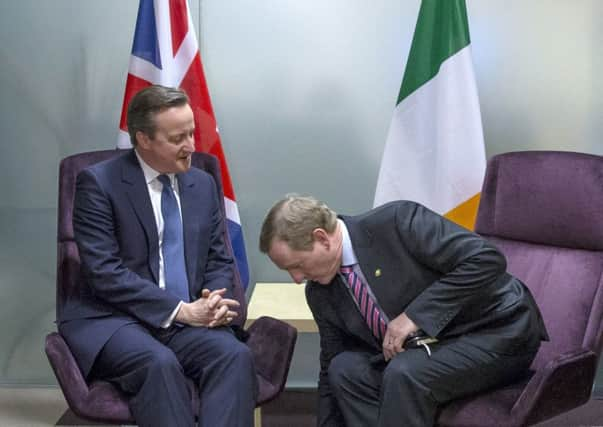Ben Lowry: Why I am now moving from being an EU '˜Out' to an EU '˜In'


It has been clear for months now that the prime minister was not aiming high in his re-negotiation.
It seemed that there was an early unspoken deal. London did not want to leave Europe and the big players in Europe did not want it to leave (not least because it is a significant net contributor to the EU budget).
Advertisement
Hide AdAdvertisement
Hide AdHe seemed to be having difficulties with smaller states but last night agreement was reached.
Mr Cameron long knew that few EU nations would agree to a major EU overhaul merely to facilitate Britain so what he needed was a fig leaf.
This week he got that, with modest agreements, for example to restrict benefits for recent arrivals from the EU.
Yet quite aside from the negotiations my own instincts on the EU have been moving from Out to In.
Advertisement
Hide AdAdvertisement
Hide AdFive or so years ago I concluded that the cultural gulf between Britain and mainland Europe was too great and that the EU and the eurozone should become synonymous, as a more tightly bonded and smaller unit (ie losing non euro countries such as the UK and Denmark, but also countries ill-suited to the euro such as Greece).
This was not a Little Englander mentality: I have always enjoyed the romance of Europe, and have traversed it by plane, boat, rail, bus and car. I will always get a buzz out of stepping on a train in London and off in Paris. There are few places in the world that beat southwest France, or Spain.
But three key things have set us apart from the continent: being islands, being a nation that speaks the world’s pre-eminent language, and the Anglo Saxon individualism that was central to the explosive success of the United States (but that also leads to problems such as an underclass).
I have long thought the EU project is partly fuelled by the fantasy that nationalism can be wished away.
Advertisement
Hide AdAdvertisement
Hide AdYou only need to watch the Eurovision song contest to see that that is a pipe dream. No-one from Britain or Ireland watches Balkan states awarding high marks to other Balkan states, or likewise with Baltic states (or any other region) and thinks: those people are part of the same country as me.
That is what people need to feel for a superstate to hold together. It is ultimately what Californians feel about Mississippians or New Yorkers feel about Texans.
It is not what Belgians think about Greeks or Greeks think about Poles and so on.
You might say that the EU is not a superstate, but its architects want it to be. The euro currency is proof of that.
Advertisement
Hide AdAdvertisement
Hide AdIn fact the euro was a clever, albeit risky, ploy in that push. By plumping for monetary union first, some degree of fiscal union and political union was likely to follow, after which you have the characteristics of a state.
The post 2007 banking, debt and single currency crises were always going to mean either that the eurozone would have to bind together more closely or that the euro would break apart.
In that case the UK was set to be on an increasingly remote outer EU tier in any event (because there is no appetite to join the euro).
So it seemed to me that the EU should become a smaller group that has political (albeit loosely federal), fiscal (ie the same fundamental tax and spending framework) and monetary union.
Advertisement
Hide AdAdvertisement
Hide AdBeyond that there would be a wider free trade area (encompassing countries such as Norway and Britain).
But increasingly I feel that we need to see how a number of things develop before we decide if we stay in the EU.
We need to see how relations between Nato and Russia pan out.
We need to see whether the euro does indeed survive.
We need to see if the waves of migration across the Mediterranean begin to die down (my suspicion is that they will get worse and worse, given the catastrophic increases in the world’s population and the disastrous global wealth imbalance, from which we benefit to an almost indecent extent).
Advertisement
Hide AdAdvertisement
Hide AdWe need to see if the terrifying Isis phenomenon is a blip (which I hope) or something more apocalyptic (which I fear).
We need to see if the EU is capable of responding to these challenges in any meaningful way or whether it is irrelevant amidst them.
It is sobering to think that exiting the EU is irreversible.
I am still unsure how I will vote but I am moving from being an EU Out to an EU In.
Or, more accurately, to an EU Not Out (For Now).
A BRITISH ISLES BLOC
Advertisement
Hide AdAdvertisement
Hide AdIf the EU ever breaks apart, I wonder if it should be replaced by three or four blocs. We are told that in an age of globalisation nations need to pool together in trading or military alliances. Perhaps there would be a northern EU and a southern EU, of nations with similar values and fiscal instincts. Perhaps a Scandinavian Union.
Perhaps a British Isles bloc, of the UK and Irish Republic.
The two islands have a 70 million population and good relations with the Anglosphere. Given the rise of devolution, a more federal UK might in any event be coming.
An even more loosely federated five-part Britain-Ireland ought not to be a huge leap, given ever-improving London-Dublin relations. But it would in truth be inconceivable, given that people in the Republic recoil at the geographic term British Isles, let alone more.